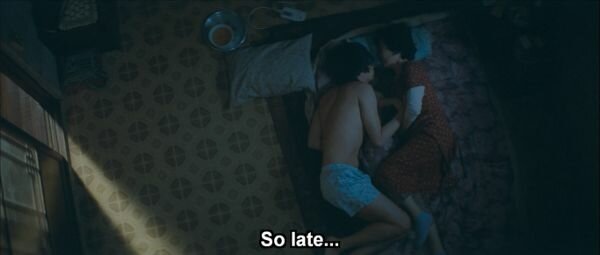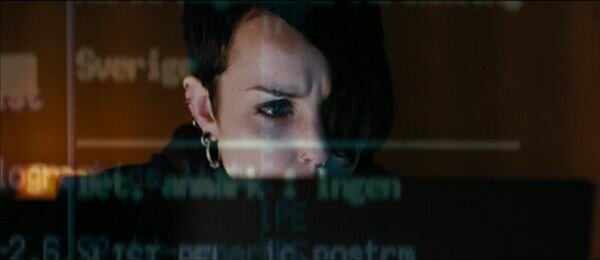Do you like weird films?
No really, this is a serious question. Can you handle a really strange film? Like, just shy of two hours of "I abandoned my child/I drink your milkshake" strange? Little Miss Sunshine toss grandpa in the trunk and compete in the pageant strange? The Wicker Man late night orgy strange?
Good. I'm glad.
Equally important: can you accept a film that requires camp and utter sincerity to be effective?
You can? Great.
Find a copy of Exte: Hair Extensions. You will not be disappointed.
Sion Sono has made some of the most bizarre and riveting horror films of the 2000's. In Suicide Club, a wave of mass suicides has hit Japan and no one can explain why. Schoolgirls jump in front of subway cars, comedians incorporate actual death into their acts, and mothers slice off their own limbs. What is the cause? And why does Japan have such amazing pop music like Dessert (no fair, they were made up for the film) while we get Justin Beiber? It's just not fair, I tell you. I'd take "Mail Me" any day over "Lonely Girl."
Then there's the follow-up (but not really) film Noriko's Dinner Table. This is the story of a family during the same period as Suicide Club that is designed to elucidate some of the events of the first film while completely destroying the interpretation of others. A web community exists that sometimes encourages teenage girls to leave home and join up with a quasi-prostitution ring, wherein young escorts take on the role of a daughter, a friend, a mother, or other female relation for very lonely men with no one else. It's actually stranger than Suicide Club. Only far, far less bloody. Except, of course, where scenes from the original film are recreated or reedited for inclusion in Noriko's Dinner Table. Then it flows like Kill Bill: fast, hard, and all over the place. Clean-up must be half the budget for your average Sion Sono production.
It would be irresponsible not to mention Strange Circus, as the title is very apt. There is a minor trend in modern Japanese horror involving authors writing horrific stories, recreating horrific events through fiction, or altering the world with fiction. Sono's attempt is unique, disturbing, and challenging. Picture Flowers in the Attic, only less hopeful and with more characters.
As a director, Sono seems to believe in allowing the audience to figure out what is going on rather than spell everything out. That's probably why his films, rather than his own reputation, is what gets international attention. Modern horror doesn't really try to challenge the viewer. If there's a struggle, it's because of a poorly written screenplay or inconceivable twist. Sono's craft is in opening up what could be a strange but straightforward narrative into something far more open to interpretation and discussion.
In a way, Exte: Hair Extensions is a departure from that. There is a definitive answer to what's happening in the film and it's a doozy. The twist at the end (well, one of them: Sono always has twist upon twist upon twist in his films, mostly to their benefit) is genuinely surprising. And confusing. And perfectly rational in the context of the film. But no less easy to watch.
There are two divergent plot strands in the film. First, killer hair extensions. As in, hair extensions that kill. This is handled with a very interesting balance of high camp and high suspense; they are not mutually exclusive. There will be scenes where you are laughing and groaning one second, covering your eyes the next, then rolling them to the top of your head before shuddering in terror and shedding a tear.
Second, child abuse. I was not expecting this plot element in the film (kind of gets overshadowed by the promise of killer hair extensions in recommendations) but it is handled with such sensitivity and skill by Sono and the cast that I wish more people paid attention to it. Basically, the main character's sister is a crazy party girl (too old to be partying) who abandons her child at the main character's house so she can do more partying. The main character and her roommate discover bruises and cuts. They witness first hand the horrors the mother is subjecting her child to and do everything they can to bring some sense of normalcy to the young girl's life. Even here, there is a blend of camp and suspense that is unpredictable. Well, ok: the results are utterly predictable as a story arc, but the events themselves are shocking and brutal.
If you are in the mood for a fresh horror film that requires you to be engaged in the narrative, give Exte: Hair Extensions a try. I don't think you'll regret it.
I'm not embedding the trailer because it has way too many spoilers. I doubt I would have enjoyed the film nearly as much if I saw that. Literally every death and scare is telegraphed in the trailer.
So, here's another tactic: Did you like Kill Bill Vol. 1? Do you remember the Crazy 88 school girl with the fantastic fight against The Bride? Or the track star character in Battle Royale with the ultimate rape/revenge fantasy? Yeah, she's the lead in this film, playing a totally different character from either film, and she's amazing.
Full review later today.


